Your search 'energy loss converting coal to hydrogen' did not match any products.
Showing results using some of your search terms 'energy loss converting coal to hydrogen'
Search results for 'coal to'
-
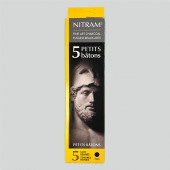
Nitram Charcoal Petits Batons, Soft Round 6mm
£11.95Nitram Charcoal Petits Batons Soft Round 6mm (5 sticks per pack) Learn More -
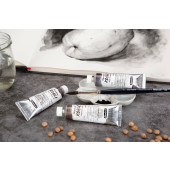
Schmincke Liquid Charcoal 15 ml
Starting at: £18.30
Liquid charcoal in the 15 ml tube - a clean, dust-free way of painting, charcoal drawing and underpainting with charcoal. The three pigments of natural origin used for this (PBK 8, pit black) are created by charring fruit seeds from the EU area and result in the following unique coal nuances: a neutral peach stone black - 18 757 a warm, brownish cherry pit black - 18 756 a cool, bluish grape seed black - 18 755 Due to the larger quantity of available paint, liquid charcoal can be used to quickly process large areas. The liquid charcoal contains the high-quality binder gum Arabic like traditional artists' watercolours (gouaches, watercolours, etc.), has a gouache-like consistency and can be diluted with water, so that different shades, structures and layer thicknesses can be achieved by different application. Depending on the substrate and the thickness of the layer, it can be wiped off by hand and removed with water. Used as thin underpainting (e.g. in oil painting), subsequent paints do not become dirty or become less dirty than with conventional charcoal underpainting due to the higher adhesion of the bound carbon pigments to the substrate. Of course, the liquid charcoal can be combined with drawing charcoal. The blurring and removability of the liquid charcoal depends on the surface of the substrate - the more even and firm the surface, the easier to change the application. Pre-tests are recommended. Learn More -
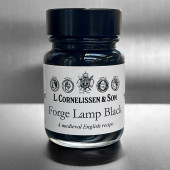
Cornelissen Historical Inks, Forge Lamp Black
Starting at: £9.00
Prepared exclusively for Cornelissen following a Medieval English recipe, This handmade ink is produced in Cambridgeshire, from soot harvested from a working 19th-century forge, powered by charcoal and wood. Small batches of ink are blended to give the required consistency and strength. Forge Lamp Black is a thick, smooth non-waterproof ink that has good permanence. It can be watered down, and should always be shaken well before use. As with all handmade products derived from natural ingredients, there may be slight variations in the colour and consistency. Ingredients: Soot, gum Arabic, and clove oil.
Not suitable for fountain pens. Learn More -
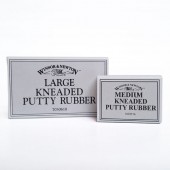
Winsor & Newton Kneadable Erasers
Starting at: £2.75
For removing pencil, charcoal and pastel or paper cleaning. Learn More -
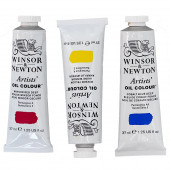
Winsor & Newton Artists' Oil Colour 37 ml
Starting at: £10.15
This long established artists' quality oil colour range of 113 colours is well known for its firm consistency and excellent handling properties. Learn More -
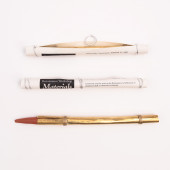
Porte-Crayon Brass Holder, Renaissance Workshop Materials
£48.50Handmade Porte-Crayon in brass for holding chalk or charcoal. Commonly used by artists in the Renaissance for drawing, the piece of sharpened chalk or charcoal is inserted into the end of the holder and secured in place by a sliding ring. Learn More -
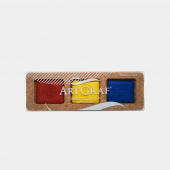
ArtGraf Tailor Shape Primary Colours Set of 3
£24.00Extremely soft and water soluble, this primary set of 3 colours allows you to create a wide range of colours with both opaque and transparent properties. Learn More -
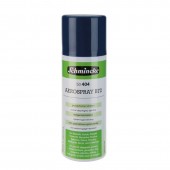
Schmincke Aerosol B72 300ml
£18.90Performs in a similar protective way as Lascaux Fixative. Non yellowing, crystal clear and age-resistant. Suitable as a fixative and protection for pencil, charcoal, pastels, watercolours, gouache, inks, metal leaf, photos and prints. Can also be used as a final varnish for oil and acrylic colours. Invisible on absorbent surfaces and semi matt very slightly glossy on non absorbent surfaces. Learn More -
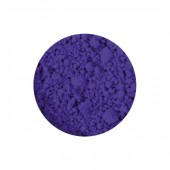
Ultramarine Blue Dark Pigment
Starting at: £4.00
PB29
Ultramarine Blue Dark is an artificial mineral pigment that is produced by heating clay, soda, sulphur and coal to high temperatures. Its name comes from outremer, or over-the-sea, as a reference to the highly-prized Lapis Lazuli pigment which had been imported into Europe from Afghanistan since the Middle Ages. First manufactured in France and Germany in 1828, synthetic Ultramarine provided a brilliant and affordable blue to artists, and it remains one of the most popular blues on artists' palettes today.
It is a transparent pigment, with a high tinting strength and excellent lightfastness. It reacts to alkali, therefore it is not suitable for use in lime-fresco; we do offer a Limeproof Ultramarine Blue for this purpose. It is stable in all other media, although it can be tricky to grind in oil. Instead of creating a thick, buttery paste, it can remain stringy and deteriorate when stored in a tube. To correct this, many commercial paint manufacturers include additives and waxes in their recipes; if you intend on grinding your own paint, you could try replacing 10-15% of your Linseed Oil with Poppy Oil to improve the consistency. Ultramine Blue provides a slow-drying, fairly hard paint film, which can tend towards brittleness.
Toxicity: B
Learn More -
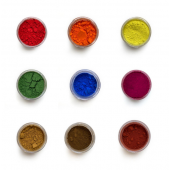
-
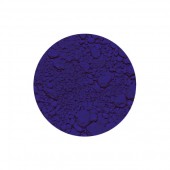
Ultramarine Blue Light Pigment
Starting at: £6.00
PB29
Ultramarine Blue Light is an artificial mineral pigment that is produced by heating clay, soda, sulphur and coal to high temperatures. Its name comes from outremer, or over-the-sea, as a reference to the highly-prized Lapis Lazuli pigment which had been imported into Europe from Afghanistan since the Middle Ages. First manufactured in France and Germany in 1828, synthetic Ultramarine provided a brilliant and affordable blue to artists, and it remains one of the most popular blues on artists' palettes today.
It is a transparent pigment, with a high tinting strength and excellent lightfastness. It reacts to alkali, therefore it is not suitable for use in lime-fresco; we do offer a Limeproof Ultramarine Blue for this purpose. It is stable in all other media, although it can be tricky to grind in oil. Instead of creating a thick, buttery paste, it can remain stringy and deteriorate when stored in a tube. To correct this, many commercial paint manufacturers include additives and waxes in their recipes; if you intend on grinding your own paint, you could try replacing 10-15% of your Linseed Oil with Poppy Oil to improve the consistency. Ultramine Blue provides a slow-drying, fairly hard paint film, which can tend towards brittleness.
Toxicity B
Learn More -
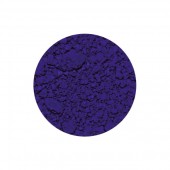
Ultramarine Blue Limewash Pigment
Starting at: £6.30
PB29
Ultramarine Blue Limewash is an artificial mineral pigment that is produced by heating clay, soda, sulphur and coal to high temperatures. Its name comes from outremer, or over-the-sea, as a reference to the highly-prized Lapis Lazuli pigment which had been imported into Europe from Afghanistan since the Middle Ages. First manufactured in France and Germany in 1828, synthetic Ultramarine provided a brilliant and affordable blue to artists, and it remains one of the most popular blues on artists' palettes today.
It is a transparent pigment, with a high tinting strength and excellent lightfastness. Most Ultramarine colours react to alkali and are therefore unsuitable for use in lime-fresco; Limeproof Ultramarine Blue remedies this problem. It is stable in all other media, although it can be tricky to grind in oil. Instead of creating a thick, buttery paste, it can remain stringy and deteriorate when stored in a tube. To correct this, many commercial paint manufacturers include additives and waxes in their recipes; if you intend on grinding your own paint, you could try replacing 10-15% of your Linseed Oil with Poppy Oil to improve the consistency. Ultramine Blue provides a slow-drying, fairly hard paint film, which can tend towards brittleness.
Toxicity: B
Learn More -
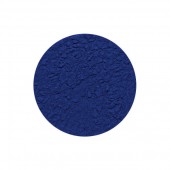
Ultramarine PB29 Pigment
Starting at: £9.10
PB29
Ultramarine Blue is an artificial mineral pigment that is produced by heating clay, soda, sulphur and coal to high temperatures. Its name comes from outremer, or over-the-sea, as a reference to the highly-prized Lapis Lazuli pigment which had been imported into Europe from Afghanistan since the Middle Ages. First manufactured in France and Germany in 1828, synthetic Ultramarine provided a brilliant and affordable blue to artists, and it remains one of the most popular blues on artists' palettes today.
It is a transparent pigment, with a high tinting strength and excellent lightfastness. It reacts to alkali, therefore it is not suitable for use in lime-fresco; we do offer a Limeproof Ultramarine Blue for this purpose. It is stable in all other media, although it can be tricky to grind in oil. Instead of creating a thick, buttery paste, it can remain stringy and deteriorate when stored in a tube. To correct this, many commercial paint manufacturers include additives and waxes in their recipes; if you intend on grinding your own paint, you could try replacing 10-15% of your Linseed Oil with Poppy Oil to improve the consistency. Ultramine Blue provides a slow-drying, fairly hard paint film, which can tend towards brittleness.
Toxicity: B/C
Learn More -
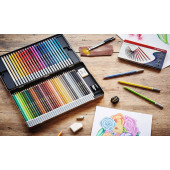
STABILO CarbOthello Pastel Pencil Sets
Starting at: £25.20
STABILO CarbOthello is a chalk pastel coloured pencil range available in up to 60 colours. With its wonderfully dry and dusty stroke it is just like a chalk pastel in pencil format. It's very popular with artists, art students and people with creative hobbies. Its high pigmentation guarantees great luminosity and opacity as well as colour fastness and colour brilliance especially on dark backgrounds and delicate papers. What's more it can be sharpened to a very fine tip which make it ideal for detail. Colours can be dry mixed and blended which makes colouring more fun and special.
Learn More -
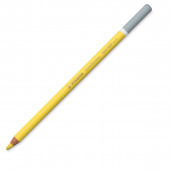
STABILO CarbOthello Pastel Pencils
Starting at: £2.05
STABILO CarbOthello is a chalk pastel coloured pencil range available in up to 60 colours. With its wonderfully dry and dusty stroke it is just like a chalk pastel in pencil format. It's very popular with artists, art students and people with creative hobbies. Its high pigmentation guarantees great luminosity and opacity as well as colour fastness and colour brilliance especially on dark backgrounds and delicate papers. What's more it can be sharpened to a very fine tip which make it ideal for detail. Colours can be dry mixed and blended which makes colouring more fun and special.
Learn More -
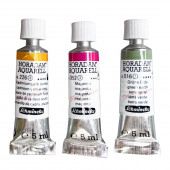
Schmincke Artists Watercolour 5 ml Tube
Starting at: £6.35
Finest quality watercolours made in Germany. This range offers 139 colours, including 95 single-pigment colours, 3 perylene pigments, 5 quinacridone pigments, and a selection of granulating colours. They present endless mixing possibilities, and can combined with Schmincke's selection of watercolour mediums as well as with their gouache paints. The solid colours are produced by pouring the liquid paint into the pans four times, ensuring the maximum yield for each colour. Also available in half and whole pans and 15ml tubes. Learn More -
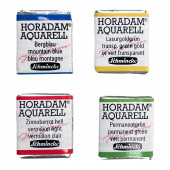
Schmincke Artists Watercolour Half Pan
Starting at: £6.05
Finest quality watercolours made in Germany. This range offers 139 colours, including 95 single-pigment colours, 3 perylene pigments, 5 quinacridone pigments, and a selection of granulating colours. They present endless mixing possibilities, and can combined with Schmincke's selection of watercolour mediums as well as with their gouache paints. The solid colours are produced by pouring the liquid paint into the pans four times, ensuring the maximum yield for each colour. Also available in whole pans and tubes of 5 and 15ml. Learn More -
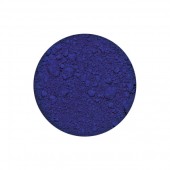
Oriental Blue Pigment
Starting at: £5.40
Oriental Blue Pigment (PB29). Inorganic pigment consisting kaolin, soda ash, sulfides and coal. Semi-transparent. High tinting strength. Excellent Lightfastness. Medium to slow drying rate. Suitable in all media except Lime-fresco. Used since early 19th Century. Toxicity B Learn More -
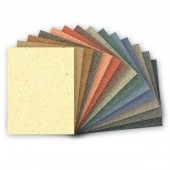
Sennelier Pastel Card
Starting at: £102.50
Sennelier Pastel Card 400gsm 50 x 65 cm. Finely ground ph neutral vegetable flakes and cork are hand applied to a 200lb ph neutral board to give a paper that is slightly abrasive with a uniform tooth. This unique paper gives enhanced adhesion so that pastels need the minimum of fixing. Learn More -
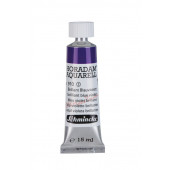
Schmincke Horadam Aquarell, Artists' Watercolour, 15 ml Tube
Starting at: £12.65
Finest quality watercolours made in Germany. This range offers 139 colours, including 95 single-pigment colours, 3 perylene pigments, 5 quinacridone pigments, and a selection of granulating colours. They present endless mixing possibilities, and can combined with Schmincke's selection of watercolour mediums as well as with their gouache paints. The solid colours are produced by pouring the liquid paint into the pans four times, ensuring the maximum yield for each colour. Also available in half and whole pans and 5ml tubes. Learn More -
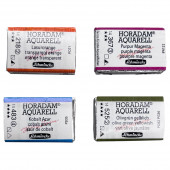
Schmincke Artists Watercolour Whole Pan
Starting at: £7.95
Finest quality watercolours made in Germany. This range offers 139 colours, including 95 single-pigment colours, 3 perylene pigments, 5 quinacridone pigments, and a selection of granulating colours. They present endless mixing possibilities, and can combined with Schmincke's selection of watercolour mediums as well as with their gouache paints. The solid colours are produced by pouring the liquid paint into the pans four times, ensuring the maximum yield for each colour. Also available in half pans and tubes of 5 and 15ml. Learn More -
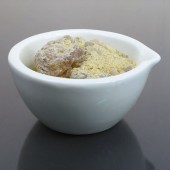
Gum Copal Manila
Starting at: £6.00
Gum Copal Manila is derived from the resin of a coniferous tree native to the Philippines. It is not to be confused with other copals, which are the product of fossilised plant materials. It can be dissolved in alcohol to make a spirit varnish, to be used as a substitute for shellac, or as a fixative for pastel and charcoal drawings. Please note, that when used as a fixative it may darken the colour of the image. Learn More -
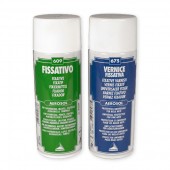
Maimeri Fixative Varnish
Starting at: £14.95
Non-yellowing synthetic resin dissolved in ethyl alcohol. 609 is for use on charcoal, pencil, pastel, watercolour and gouache, 675 is for universal use. Use sparingly to fix and protect your pieces. Learn More -
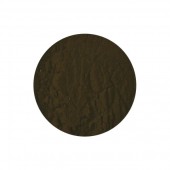
Van Dyke Brown Pigment
Starting at: £4.50
Van Dyke Brown pigment is know for its poor lightfastness and instability in all mediums. Our Van Dyke Brown, also known as Cassel Earth, offers the same dark brown colour and transparency as the traditional pigment, but without the drawbacks usually associated with its longevity and use. It is made from lignite, or brown coal, from the Alsace region in France.
Toxicity: B
Learn More -
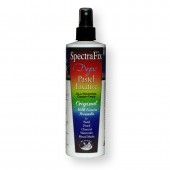
Spectrafix 360ml
£25.95Spectrafix 360ml. A natural non-toxic milk casein fixative based on an antique recipe used by Degas himself. This is the perfect fixative for pastel, charcoal, gouache and watercolour. Its workable matt finish allows deep layering with minimal colour shift. Learn More -
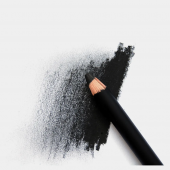
ArtGraf Soft Carbon Pencil
£1.50Call to Order
Water-soluable soft carbon pencil similar to charcoal. Learn More



